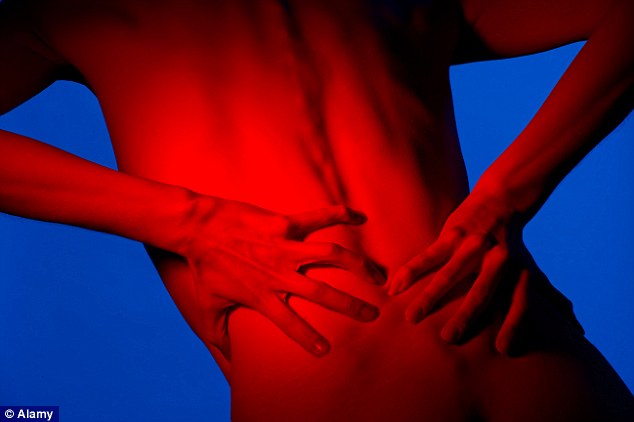How is YOUR job making you ill? From bakers to pilots, the conditions that go with the territory in your line of work
- Those who stand for long periods at work are more prone to varicose veins
- Sitting for long periods can be bad news, raising the risk of type 2 diabetes
- Here, we look at some of the other surprising ways in which different occupations can affect your well-being
Celebrity chef, astronaut, teacher - whatever your dream job, or even your current one, you may not have given much thought to the impact it could have on your health.
It's well-known that people whose work involves standing for long periods, such as hairdressers, nurses, teachers and surgeons, are more prone to varicose veins.
But, in recent years, evidence has emerged that sitting for long periods can be bad news, too, raising the risk of type 2 diabetes, heart disease and premature death.
But some job-related health risks are more unexpected. Last month, for example, a study in the Journal of Neurology, Neurosurgery and Psychiatry revealed that undertakers may be four times more likely to develop motor neurone disease - the neurological disease that Stephen Hawking has - possibly because of their exposure to formaldehyde.
Here, we look at some of the other surprising ways in which different occupations can affect your well-being...
Scroll down for video

Around 10 per cent of adult asthma cases are thought to be as a result of their jobs
Bakers who find it hard to breathe
Around 10 per cent of adult asthma cases are thought to be as a result of their jobs. One at-risk group is bakers, who develop it from breathing in flour, explains Professor Paul Cullinan, a consultant respiratory physician at Royal Brompton Hospital in London.
'Flour contains proteins that the body recognises as foreign when inhaled - it can then set up an allergic response to those proteins,' he says.
'Bakers who develop this problem usually do so in the first year or two, and then have to give up their work.'
Less common in factories, because much of the work is done by machine, the condition is more of a problem in supermarkets that have their own bakeries.
'But I've only seen one case of someone getting bakers' asthma at home,' says Professor Cullinan. 'They had their own baking business and were making masses of bread and cakes.'
Others at risk of developing asthma for the first time through work are those who handle animals for a living, as well as hairdressers, who may develop the condition from breathing in the chemicals used in bleaching powder.
Teachers damaging their vocal cords

'The combination of talking loudly and talking often can cause a variety of things'
Teachers are particularly prone to problems with their voice, says Declan Costello, a consultant ear, nose and throat surgeon specialising in voice disorders at the Queen Elizabeth Hospital, Birmingham.
'Teachers are probably the single biggest group that I see because of the demand of having to raise their voice over 30 children.
'The combination of talking loudly and talking often can cause a variety of things, from getting a husky voice to losing it completely, to having an ache or burning in the throat.'
A husky voice and pain in the throat may also be a sign of nodules - calluses on the vocal cords - which can develop when the voice is over-used and the vocal cords rub together too frequently, says Yabuku Karagama, a voice specialist at Manchester Royal Infirmary.
'People associate nodules with singers but, actually, teachers are more prone to them because they tend to have less training about how to use their voice correctly.
'If you do get nodules, you may need speech therapy to help you control your voice and, if the nodules don't go away after a few months, you may need an operation to remove them.'
The secret to protecting your voice is not allowing the muscles to get too tight, while still producing a reasonable volume, say Mr Costello.
'It might be about using a different pitch or relaxing the muscles in the neck, for example.'
He adds that some teachers use a clip-on microphone to amplify their voice, or carry a whistle to reduce shouting in the playground.
'It's also important to have good vocal hygiene, such as drinking water and avoiding caffeine, because it dries the mouth and throat and can cause the mucus in the voice box to become sticky - it should be soft to allow the vocal cords to vibrate properly.'
Hairdressers with painful feet

Long periods of standing up can cause problems with the feet, such as plantar fasciitis
It's not just asthma that hairdressers are prone to. As a result of the various chemicals and products they come into contact with, up to 70 per cent of hairdressers suffer from skin problems, particularly contact dermatitis - inflammation of the skin that leaves it painfully red, dry and cracked.
'It may be an allergic response to the chemicals or an irritant reaction,' says Dr Bav Shergill, a consultant dermatologist and spokesman for the British Association of Dermatologists.
'Washing hands a lot can strip them of natural oils, which can make them dry and chapped and more prone to irritation. And handling split ends can cause tiny cuts on the skin, which can damage the natural skin barrier, leading the body to start regarding some of these chemicals as foreign. It can also leave the hands open to infections.'
The dermatitis will usually disappear but, if the hairdresser has developed an allergy, it could still flare up whenever they come into contact with the offending chemical - such as when they get their own hair coloured or treated.
The long periods of standing up can cause problems with the feet, too, such as plantar fasciitis - a painful thickening of the band of tissue that runs underneath the sole of the foot, says Mike O'Neill, a consultant podiatrist and spokesman for the College of Podiatry.
'I've also seen cases where tiny bits of hair have become buried in hairdressers' feet - the sharp hair can cut the skin and form little abscesses, so hairdressers should check their feet towards the end of the day to get rid of any bits of hair.'
Pilots facing a high risk of cancer
The apparently glamorous life of a pilot or cabin crew may put them at significantly higher risk of skin cancer - specifically malignant melanoma, according to a study of occupational mortality, published in 2009 by the Office for National Statistics and the Health and Safety Executive.
Some researchers suggest that exposure to cosmic radiation - high-energy rays originating from outside the solar system - may be a contributing factor.
However, dermatologist Dr Bav Shergill isn't convinced. Nor does he believe that people working in the air are exposed to more intense UV radiation simply because they are higher up.
'Most of the ozone layer, which filters out some of the harmful radiation, is still higher than the planes are,' he points out.
Instead, he thinks the problem is linked to what these professionals do when they reach their destination.
'I treat a lot of cabin crew for skin cancer. They fly somewhere hot and sunny for a few days, get a lot of sun exposure very quickly, burn a bit, come home and repeat the process.
'Getting intermittent hits of sun exposure that can burn or tan the skin seems to increase the risk of skin cancer later in life.'
A 2005 study from Iceland found that airline pilots are three times more likely to develop nuclear sclerotic cataracts - the most common type of cataract which occur when the centre of the eye's lens becomes clouded and hardened. The exact cause of cataracts is unknown, though lifelong exposure to sunlight may increase risk.
Back pain that cripples dentists
Having to bend over patients' mouths all day can give dentists back problems, says Sammy Margo, a physiotherapist based in North London.
'I treat a lot of dentists with problems of the thoracic (or middle) spine. Although they are highly trained at maintaining the correct posture, having to do it for so many years can have a cumulative effect.
'They get pain and stiffness in the middle back and can develop thoracic kyphosis - curvature of the back that makes them look more rounded.
'And as the thoracic spine becomes stiff, the neck and lower back can compensate, leading to stiffness in those areas, too.' This can lead to arthritis over time.

'Although they are highly trained at maintaining the correct posture, having to do it for so many years can have a cumulative effect'
Lorry drivers who age quicker
There are anecdotal reports of lorry drivers developing Bell's Palsy - temporary weakness or paralysis of the face - as a result of wind blowing through their side window.
But there's 'no good scientific evidence' to suggest this can really be the cause, says Charles Nduka, a consultant plastic surgeon and medical adviser to Facial Palsy UK.
He explains that the condition is usually the result of a virus, which causes the facial nerve to become inflamed.
However, studies have suggested that lorry drivers may be at greater risk of sun damage on the side of their face that is next to the driver's window.
A striking image was published in the New England Journal of Medicine of a U.S. truck driver - the left-hand side of his face was deeply lined, pitted and sagging after 28 years of sun exposure, whereas the right-hand side was relatively unblemished.
Standard glass won't protect you against UVA rays, which are typically associated with skin ageing, 'so you could have skin damage sitting by an office window', adds Dr Bav Shergill.
Lifeguards with bad hearing
It's well-known that exposure to loud noises can put your hearing at risk. But it's not just those who work with power tools or play in heavy metal bands who should take care.
People who work in gymnasiums and swimming pools (such as PE teachers or lifeguards) could unwittingly be risking their hearing, too, says Gemma Twitchen, senior audiologist at the charity Action on Hearing Loss.
'Big, open spaces with lots of hard surfaces mean sound can be reflected. If you think about it, when you go to a swimming pool it's very echoey and noisy.
'If you're working in that environment all the time, there could be a risk if you're being exposed to noise above 85 decibels (the point at volume at which sound can damage hearing).' A 2006 Italian study that examined the acoustic conditions of pools and gymnasia in schools found that 80 per cent of the facilities tested did not stick to official limits on reverberation times (the length of time it takes for sound to die away).
Gemma Twitchen also recommends that all musicians, including classical musicians, wear earplugs while rehearsing and performing.
'The louder the noise you are exposed to, the sooner the damage occurs, but prolonged exposure to loud noise can also take its toll - and orchestras can be very loud.'

Lifeguards on the beach might be safe but those working at gymnasiums and swimming pools could unwittingly be risking their hearing
Sailors could be ruining their eyes
Sailors are at risk of eye problems such as pterygium - growths that develop across the cornea, the clear dome at the front of the eye, says Robert Scott, a consultant ophthalmologist at BMI The Priory Hospital, who has worked as a military doctor.
'You get more exposure to ultra violet light at sea because it's reflected off the water, so it's important to wear sunglasses.'
Nurses face years of skin trouble
Around 1,000 nurses a year are thought to develop work-related contact dermatitis - their risk is seven times higher than the average for all professions, according to the Health and Safety Executive.
Frequent exposure to soaps and cleaners is largely to blame, as well as work involving wet hands. And frequent contact with latex - or to the chemicals used to harden rubber - found in protective gloves, can cause people to develop allergies, leading to an itchy, tingly rash.
As dermatologist Dr Bav Shergill explains: 'We're trying to move to non-latex gloves in the clinical environment now to prevent this happening and to stop inadvertently touching patients who are allergic to latex. But some doctors still use them, particularly when they need good sensitivity to what they are touching, and other professions who use latex gloves are still at high risk - such as cleaners and gardeners.'
Other health risks facing health professionals include addiction to drink or drugs, with one in six doctors affected at some stage, according to a Government-funded study, which some have put down to the stress of their jobs.
Health professionals and those who work in agriculture have the highest suicide rates, reported the British Journal of Psychiatry in 2008.
This 'suggests a link between occupation and access to, and knowledge of, methods of taking one's own life', the report said.
Veterinary surgeons are around twice as likely to commit suicide as other healthcare workers and four times more likely than the general population, research suggests.
Most watched News videos
- Moment suspected CEO shooter wrestles with police outside court
- CCTV captures Solange Knowles attacking Jay-Z in hotel elevator
- A look at suspected CEO shooter Luigi Mangione
- Horror moment tree crashes at a popular tourist hotspot in Bali
- Cuffed Luigi Mangione escorted into police station after arrest
- Balaclava-clad moped riders hurl rocks at car and house
- Moment woman is KNOCKED OUT while being questioned by cops in Brazil
- Cuffed Luigi Mangione escorted into PA police station
- Watch CEO shooting suspect's valedictorian speech from 2016
- Disturbing healthcare CEO 'Wanted' signs hung up in Manhattan
- Tourist in his underwear fights off SEVEN officers during rampage
- Emergency services respond after Ilford house engulfed in flames


















































































































































































































































































































































































































